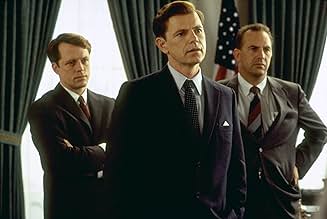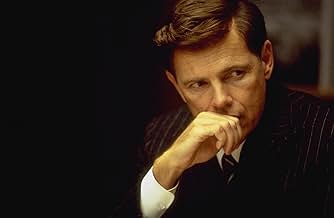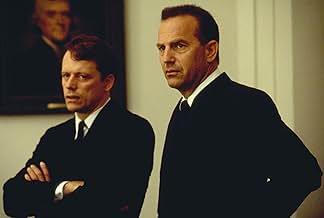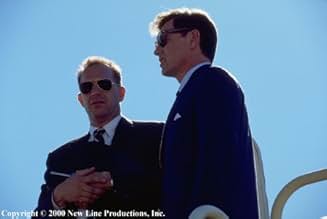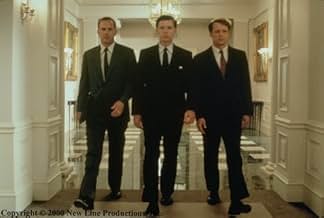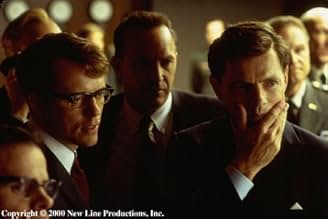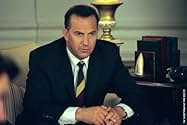En octubre de 1962, la administración Kennedy intenta contener la crisis de los misiles cubanos.En octubre de 1962, la administración Kennedy intenta contener la crisis de los misiles cubanos.En octubre de 1962, la administración Kennedy intenta contener la crisis de los misiles cubanos.
- Dirección
- Guionistas
- Elenco
- Premios
- 3 premios ganados y 8 nominaciones en total
- Dirección
- Guionistas
- Todo el elenco y el equipo
- Producción, taquilla y más en IMDbPro
Opiniones destacadas
Shown through the eyes of presidential aide Kenneth P. O'Donnell (Kevin Costner), we see the inner workings of President John F. Kennedy (Bruce Greenwood) and his closest advisors as they try and find the best way to end a potentially devastating showdown with the U.S.S.R. In October of 1962, the U.S., during a regular mission photographing Cuba, spotted a missile buildup by the Russians. The missiles were powerful enough to kill 80 million Americans with only 5 minutes of warning time. President Kennedy had to decide quickly what action to take. With his trusted aide Kenny O'Donnell and his brother Attorney General Robert F. Kennedy (Steven Culp), and others such as Robert McNamara, Adlai Stevenson, McGeorge Bundy, Dean Acheson, Dean Rusk, and many more, Kennedy needed to figure out the best course of action. If he allowed the Russians to aim these missiles at the U.S., the United States would be placed in a potentially deadly situation. If Kennedy allowed the military to attack the missiles and destroy them, what would Russia do as a response? If he waited too long, would Russia simply attack the U.S.? If he backed down and agreed to take down U.S. missiles in Turkey, would the U.S. then look weak to the rest of the world? For such a young President, Kennedy had a lot of tough decisions to make, in a short amount of time, with the world hanging in the balance.
I wasn't alive during the Cuban Missile Crisis as it occurred, so seeing Thirteen Days was like having a history lesson at the same time as having great entertainment. Even though I knew that we didn't end up in World War III, there were a lot of things I didn't know. I won't go into any of the specifics, but I never fully understood how close we came to destroying the planet. The tensions of the time were brought out successfully by director Roger Donaldson. You could see and feel the sweat on all the major players as each minute ticked by. Bruce Greenwood did a tremendous job as the young President Kennedy, showing how Kennedy was strong enough to stand by his morals and values, even as his most trusted advisors were urging him to go to war. At the same time, Greenwood was able to portray Kennedy as someone who needed help and was able to turn to his brother for guidance. Kevin Costner did a good job as Kennedy's presidential aide. I especially liked his boston accent. Costner was a strong personality that worked well with Greenwood and Steven Culp. I believed that the three of them were friends for 15 years and that they trusted each other with their own lives. Other acting standouts to me were Dylan Baker as Robert McNamara and Michael Fairman as Adlai Stevenson.
Even running at almost two and a half hours, I was always at the edge of my seat, wondering what was going to happen next. Like I said before, I wasn't even born yet, nor was it something I ever learned about in school, so I had no idea what was going to happen. It was nice being able to get deep inside the mind of these important people during this crucial time. Of course, I have no idea if what was said during these meetings was actually said in real life, but I'd like to believe that at least the outcomes of the meetings were true. I'm a big fan of these kinds of dramatic films based on real life events. While being entertaining, they also have the ability to teach you about history. Reading about these situations in books isn't nearly as enjoyable as being able to watch them on screen. I think screenwriter David Self did a great job of bringing these real life events to life on the big screen. He made it historical but didn't bore you with too much talk or information. Along with Donaldson, he gave you what you needed to know, and let the actors bring you into the action.
So overall, I thought Thirteen Days was a great film. Well acted, well directed, well written, nice musical score and very entertaining throughout. And if you happen to learn something along the way like I did, then even better.
I wasn't alive during the Cuban Missile Crisis as it occurred, so seeing Thirteen Days was like having a history lesson at the same time as having great entertainment. Even though I knew that we didn't end up in World War III, there were a lot of things I didn't know. I won't go into any of the specifics, but I never fully understood how close we came to destroying the planet. The tensions of the time were brought out successfully by director Roger Donaldson. You could see and feel the sweat on all the major players as each minute ticked by. Bruce Greenwood did a tremendous job as the young President Kennedy, showing how Kennedy was strong enough to stand by his morals and values, even as his most trusted advisors were urging him to go to war. At the same time, Greenwood was able to portray Kennedy as someone who needed help and was able to turn to his brother for guidance. Kevin Costner did a good job as Kennedy's presidential aide. I especially liked his boston accent. Costner was a strong personality that worked well with Greenwood and Steven Culp. I believed that the three of them were friends for 15 years and that they trusted each other with their own lives. Other acting standouts to me were Dylan Baker as Robert McNamara and Michael Fairman as Adlai Stevenson.
Even running at almost two and a half hours, I was always at the edge of my seat, wondering what was going to happen next. Like I said before, I wasn't even born yet, nor was it something I ever learned about in school, so I had no idea what was going to happen. It was nice being able to get deep inside the mind of these important people during this crucial time. Of course, I have no idea if what was said during these meetings was actually said in real life, but I'd like to believe that at least the outcomes of the meetings were true. I'm a big fan of these kinds of dramatic films based on real life events. While being entertaining, they also have the ability to teach you about history. Reading about these situations in books isn't nearly as enjoyable as being able to watch them on screen. I think screenwriter David Self did a great job of bringing these real life events to life on the big screen. He made it historical but didn't bore you with too much talk or information. Along with Donaldson, he gave you what you needed to know, and let the actors bring you into the action.
So overall, I thought Thirteen Days was a great film. Well acted, well directed, well written, nice musical score and very entertaining throughout. And if you happen to learn something along the way like I did, then even better.
I served aboard the USS Joseph P. Kennedy which was depicted in the film. The Kennedy was the ship that boarded the Marcula in the waters off the Bahamas. The Kennedy, now part of Battleship cove in Fall River, Ma., actually played herself in the film. The actual boarding was not as quite dramatic as depicted in the movie.
The boarding party for instance did not wear dress white uniforms and the Marcula was more of a "rust bucket" than depicted in the movie. Although the 5 inch guns were aimed at the vessel, I don't recall a shot being fired.
As far as the movie is concerned I though it gave a rather accurate accounting of the circumstances that surrounded this time in history with a few embellishment's that are purely thrown in as theatrical license.
The boarding party for instance did not wear dress white uniforms and the Marcula was more of a "rust bucket" than depicted in the movie. Although the 5 inch guns were aimed at the vessel, I don't recall a shot being fired.
As far as the movie is concerned I though it gave a rather accurate accounting of the circumstances that surrounded this time in history with a few embellishment's that are purely thrown in as theatrical license.
The 1962 Cuban Missile Crisis seen through the eyes of President assistant Kenny O'Donnell (Kevin Costner who hands perfectly the role )as trusted confidante and with significance importance of Robert Kennedy ( Steven Culp who bears remarkable resemblance )and of course President John F . Kennedy ( a solid Bruce Greenwood ) . This interesting film widely develops the Cuban Missile Crisis that was a confrontation between the Soviet Union, Cuba and the United States in October 1962, during the Cold War. The picture is packed with suspense , drama , historical deeds and is quite entertaining . It's correctly based on facts and the few sacrifices of accuracy are realized in the sense of of dramatic license . The motion picture is very well directed by Roger Donaldson who formerly worked with Costner in another suspenseful movie and also plenty of political intrigue titled ¨No way out (87) ¨ .
Adding more details over the widely depicted on the movie the events happened of the following manner : In September 1962, the Cuban and Soviet governments began to surreptitiously build bases in Cuba for a number of medium- and intermediate-range ballistic nuclear missiles (MRBMs and IRBMs) with the ability to strike most of the continental United States. This action was subsequent to the 1958 deployment of Thor IRBMs in the UK and Jupiter IRBMs to Italy and Turkey in 1961; more than 100 U.S.-built missiles having the capability to strike Moscow with nuclear warheads. On October 14, 1962, a United States U-2 photo-reconnaissance plane captured photographic proof of Soviet missile bases under construction in Cuba.The ensuing crisis ranks with the Berlin Blockade as one of the major confrontations of the Cold War and is generally regarded as the moment in which the Cold War came closest to turning into a nuclear conflict .The US President ( Bruce Greenwood) , Attorney General Robert Kennedy (Steven Culp ),State Secretary Robert McNamara ( Dylan Baker ) and his military staff ( Bill Smitrovich , Ed Lauter , James Karen , Len Cariou) and general Curtis LeMay (Kevin Conway ) considered attacking Cuba via air and sea and settled on a "quarantine" of Cuba. The U.S. announced that it would not permit offensive weapons to be delivered to Cuba and demanded that the Soviets dismantle the missile bases already under construction or completed in Cuba and remove all offensive weapons. The Kennedy administration held a slim hope that the Kremlin would agree to their demands, and expected a military confrontation. On the Soviet end, Nikita Khrushchev wrote Kennedy that his quarantine of "navigation in international waters and air space to constitute an act of aggression propelling humankind into the abyss of a world nuclear-missile war." Fidel Castro encouraged Khrushchev to launch a preemptive first-strike nuclear attack on the U.S. The Soviets publicly balked at the U.S. demands, but in secret back-channel communications initiated a proposal to resolve the crisis. The confrontation ended on October 28, 1962 when President John F. Kennedy and United Nations Secretary-General U Thant reached an agreement with Soviet Premier Nikita Khrushchev to dismantle the offensive weapons and return them to the Soviet Union, subject to United Nations verification, in exchange for an agreement by the United States to never invade Cuba. The Soviets removed the missile systems and their support equipment, loading them onto eight Soviet ships from November 5–9. A month later, on December 5 and 6, the Soviet IL-28 bombers were loaded onto three Soviet ships and shipped back to Russia. The quarantine was formally ended previously on November 20, 1962. As a secret part of the agreement, all US-built Thor and Jupiter IRBMs deployed in Europe were deactivated by September 1963.The Cuban Missile Crisis spurred the creation of the Hotline Agreement and the Moscow-Washington hot line, a direct communications link between Moscow and Washington .
Adding more details over the widely depicted on the movie the events happened of the following manner : In September 1962, the Cuban and Soviet governments began to surreptitiously build bases in Cuba for a number of medium- and intermediate-range ballistic nuclear missiles (MRBMs and IRBMs) with the ability to strike most of the continental United States. This action was subsequent to the 1958 deployment of Thor IRBMs in the UK and Jupiter IRBMs to Italy and Turkey in 1961; more than 100 U.S.-built missiles having the capability to strike Moscow with nuclear warheads. On October 14, 1962, a United States U-2 photo-reconnaissance plane captured photographic proof of Soviet missile bases under construction in Cuba.The ensuing crisis ranks with the Berlin Blockade as one of the major confrontations of the Cold War and is generally regarded as the moment in which the Cold War came closest to turning into a nuclear conflict .The US President ( Bruce Greenwood) , Attorney General Robert Kennedy (Steven Culp ),State Secretary Robert McNamara ( Dylan Baker ) and his military staff ( Bill Smitrovich , Ed Lauter , James Karen , Len Cariou) and general Curtis LeMay (Kevin Conway ) considered attacking Cuba via air and sea and settled on a "quarantine" of Cuba. The U.S. announced that it would not permit offensive weapons to be delivered to Cuba and demanded that the Soviets dismantle the missile bases already under construction or completed in Cuba and remove all offensive weapons. The Kennedy administration held a slim hope that the Kremlin would agree to their demands, and expected a military confrontation. On the Soviet end, Nikita Khrushchev wrote Kennedy that his quarantine of "navigation in international waters and air space to constitute an act of aggression propelling humankind into the abyss of a world nuclear-missile war." Fidel Castro encouraged Khrushchev to launch a preemptive first-strike nuclear attack on the U.S. The Soviets publicly balked at the U.S. demands, but in secret back-channel communications initiated a proposal to resolve the crisis. The confrontation ended on October 28, 1962 when President John F. Kennedy and United Nations Secretary-General U Thant reached an agreement with Soviet Premier Nikita Khrushchev to dismantle the offensive weapons and return them to the Soviet Union, subject to United Nations verification, in exchange for an agreement by the United States to never invade Cuba. The Soviets removed the missile systems and their support equipment, loading them onto eight Soviet ships from November 5–9. A month later, on December 5 and 6, the Soviet IL-28 bombers were loaded onto three Soviet ships and shipped back to Russia. The quarantine was formally ended previously on November 20, 1962. As a secret part of the agreement, all US-built Thor and Jupiter IRBMs deployed in Europe were deactivated by September 1963.The Cuban Missile Crisis spurred the creation of the Hotline Agreement and the Moscow-Washington hot line, a direct communications link between Moscow and Washington .
In 1962, the world stood on the brink of World War III for "Thirteen Days," a 2000 film starring Kevin Costner, Bruce Greenwood, Steven Culp and Dylan Baker, with direction by Roger Donaldson. The story concerns the "Cuban Missile Crisis," when the U.S. discovered that the Soviets had placed missiles aimed at the U.S. in Cuba.
As someone who remembers the situation well, watching this was a profound experience in more ways than one. A good deal of dialogue was taken from actual Presidential transcripts, which made watching it even more impressive. Looking at it from today's eyes, "Thirteen Days" is a knockout.
Donaldson focuses the film right where it should be - in the White House and in conference rooms, giving us only the subplot of Kenny O'Donnell's family life. For those posters who commented that O'Donnell was perhaps not a real person, yes, he was. It's impossible for me to believe that with a film that goes into so much detail and strove to be so factual, someone thought there was a made-up character. Try Google next time. Ken O'Donnell headed up Kennedy's presidential campaign and was appointed his Special Assistant when Kennedy won the White House. He was the most powerful of the President's advisers.
Several things become clear about the goings-on at the White House in 1962: None of the military leaders thought the Kennedy administration belonged in the White House; if it had been up to the military leaders, the situation would have caused World War III; JFK turned himself into a pretzel in order to pursue a diplomatic solution to the potential conflict. Though discouraged almost at every turn, JFK still would not allow the shooting to begin, pushing instead for an embargo against Cuba.
There is plenty of tension and excitement in this film. One of the best scenes is Commander Eckerd (Christopher Lawford) and his team low-flying over Cuba taking photos, and a U-2 pilot trying to avoid missiles chasing him. But most of the tension and excitement takes place in the meetings as the President and RFK struggle for answers and play for time. The mix is therefore ideal: drama, some aerial excitement, and a little humor as Adlai Stevenson gets the better of the Russians in an OAS meeting.
There's also a look at the reaction of the country - also very accurate. Yes, people piled into church, cleared the grocery shelves of everything, and stocked fallout shelters. We all watched the President on television. In fact, as he talked, my mother thought he was about to declare war. It was a terrifying time.
Kenny O'Donnell's role in all of this may have been somewhat exaggerated to make it a palatable role for Kevin Costner. Costner does okay in the part. Boston accents are very difficult to do without them sounding put on. It's very difficult to do accents in general and make them organic to the character. A few have succeeded: Anne Bancroft in "The Miracle Worker," Paul Newman in "Somebody Up There Likes Me," little Natalie Wood in "Tomorrow is Forever," Travolta in "Saturday Night Fever," and of course there are others. Jane Seymour and Joan Collins can easily pull off being Americans. All British actors can do a southern accent, since the southern accent started off as a British accent. Costner lays it on too thick and it's a distraction. But he certainly isn't bad in the role.
The casting people merely wanted to suggest JFK and RFK. In Steven Culp, they found a young actor with similar features to RFK. He does an effective job, given that it's tough going to portray such a famous person. The most successful in the film is Bruce Greenwood as JFK, who tries to keep the accent from overpowering the dialogue. In the President's television speech, I'm sure he imitated JFK's every single inflection and pause, and it's perfect. His JFK is a listener, very dependent on his brother's advice, and one who takes the burdens of the country on his shoulders like a cross. One of the posters here mentioned something to the effect that "we are led to believe that JFK leaned heavily on his advisors" as if this is a negative. Of course he did. Of course any President does or should. The final decisions belonged to him, and he had to be sure of all of the ramifications. Only an idiot doesn't hear every single opinion of value before he decides to launch World War III.
The camaraderie between RFK, JFK, and O'Donnell is as unmistakable as their arguments and frustrations.
Thirteen months after the Cuban Missile Crisis, JFK would be dead and O'Donnell would be riding behind him in the Secret Service Car. After a particularly tough meeting with the Joint Chiefs of Staff, O'Donnell insists that JFK sit for a minute, and JFK finally does. Worn out and not sleeping well, he laments about being President. "I just thought there would be more good days." In the end, we - and he - would have settled for just MORE days.
As someone who remembers the situation well, watching this was a profound experience in more ways than one. A good deal of dialogue was taken from actual Presidential transcripts, which made watching it even more impressive. Looking at it from today's eyes, "Thirteen Days" is a knockout.
Donaldson focuses the film right where it should be - in the White House and in conference rooms, giving us only the subplot of Kenny O'Donnell's family life. For those posters who commented that O'Donnell was perhaps not a real person, yes, he was. It's impossible for me to believe that with a film that goes into so much detail and strove to be so factual, someone thought there was a made-up character. Try Google next time. Ken O'Donnell headed up Kennedy's presidential campaign and was appointed his Special Assistant when Kennedy won the White House. He was the most powerful of the President's advisers.
Several things become clear about the goings-on at the White House in 1962: None of the military leaders thought the Kennedy administration belonged in the White House; if it had been up to the military leaders, the situation would have caused World War III; JFK turned himself into a pretzel in order to pursue a diplomatic solution to the potential conflict. Though discouraged almost at every turn, JFK still would not allow the shooting to begin, pushing instead for an embargo against Cuba.
There is plenty of tension and excitement in this film. One of the best scenes is Commander Eckerd (Christopher Lawford) and his team low-flying over Cuba taking photos, and a U-2 pilot trying to avoid missiles chasing him. But most of the tension and excitement takes place in the meetings as the President and RFK struggle for answers and play for time. The mix is therefore ideal: drama, some aerial excitement, and a little humor as Adlai Stevenson gets the better of the Russians in an OAS meeting.
There's also a look at the reaction of the country - also very accurate. Yes, people piled into church, cleared the grocery shelves of everything, and stocked fallout shelters. We all watched the President on television. In fact, as he talked, my mother thought he was about to declare war. It was a terrifying time.
Kenny O'Donnell's role in all of this may have been somewhat exaggerated to make it a palatable role for Kevin Costner. Costner does okay in the part. Boston accents are very difficult to do without them sounding put on. It's very difficult to do accents in general and make them organic to the character. A few have succeeded: Anne Bancroft in "The Miracle Worker," Paul Newman in "Somebody Up There Likes Me," little Natalie Wood in "Tomorrow is Forever," Travolta in "Saturday Night Fever," and of course there are others. Jane Seymour and Joan Collins can easily pull off being Americans. All British actors can do a southern accent, since the southern accent started off as a British accent. Costner lays it on too thick and it's a distraction. But he certainly isn't bad in the role.
The casting people merely wanted to suggest JFK and RFK. In Steven Culp, they found a young actor with similar features to RFK. He does an effective job, given that it's tough going to portray such a famous person. The most successful in the film is Bruce Greenwood as JFK, who tries to keep the accent from overpowering the dialogue. In the President's television speech, I'm sure he imitated JFK's every single inflection and pause, and it's perfect. His JFK is a listener, very dependent on his brother's advice, and one who takes the burdens of the country on his shoulders like a cross. One of the posters here mentioned something to the effect that "we are led to believe that JFK leaned heavily on his advisors" as if this is a negative. Of course he did. Of course any President does or should. The final decisions belonged to him, and he had to be sure of all of the ramifications. Only an idiot doesn't hear every single opinion of value before he decides to launch World War III.
The camaraderie between RFK, JFK, and O'Donnell is as unmistakable as their arguments and frustrations.
Thirteen months after the Cuban Missile Crisis, JFK would be dead and O'Donnell would be riding behind him in the Secret Service Car. After a particularly tough meeting with the Joint Chiefs of Staff, O'Donnell insists that JFK sit for a minute, and JFK finally does. Worn out and not sleeping well, he laments about being President. "I just thought there would be more good days." In the end, we - and he - would have settled for just MORE days.
This is an outstanding re-telling of the Cuban Missile Crisis. The weakest part of the movie of course is Kevin Costner who wisely cast himself in the part of presidential assistant Kenny O'Donnell rather than take on the JFK role. In order to give Costner a lot to do they make Kenny O'Donnell out to be a sort of behind-the-scenes king-maker rather than the office gofer that he probably really was. But it was a clever device to get the audience into the inner workings of the Kennedy White House without making JFK or RFK the lead character. The scenes that work best are when O'Donnell is the fly-on-the-wall sitting in at Cabinet meetings and meetings with the Joint Chiefs and letting the real decision-makers and advisers talk.
Much of the real JFK Cabinet discussions were recorded or transcribed for history and so I'm sure that much of the dialog for those scenes is what the principals really said. The movie is a tremendous look at crisis management and decision-making under extreme pressure.
The military leaders are made out to be the semi-villains in this movie, pushing JFK to attack Cuba and launch WWIII and at some points seeming to even disobey or skirt his orders. When watching the movie I kept remembering that JFK was the youngest man ever elected president and that he was only 45 yrs old when this happened. Most of his Cabinet and all of the Joint Chiefs were much older than him and that tension comes across as the older men seem to barely be able to hold back their condescending attitudes towards the young president.
With the exception of Costner, the acting in this movie is first rate and Bruce Greenwood as JFK was certainly deserving of Oscar consideration. It is always hard for an actor to play a historical figure like JFK who is more legend now than man. Greenwood wisely does not try to mimic JFK's accent but he does get inside the character and you can see JFK thinking his way through the crisis with nothing less than future of the entire human race riding on his decisions. Steven Culp was outstanding as well as RFK, perfectly mimicking RFK's mannerisms and way of speaking but again, getting inside the character so we can really see the man rather than just an impersonation. The success of the entire movie depending on Greenwood and Culp nailing their parts and they did so terrifically.
Viewers might be interested in finding a copy of "Missiles of October" which was a TV-movie in the 1970s and done much like a stage play. William Devane played JFK and Martin Sheen RFK. The movie also gave much screen time to the Kruschev character.
Much of the real JFK Cabinet discussions were recorded or transcribed for history and so I'm sure that much of the dialog for those scenes is what the principals really said. The movie is a tremendous look at crisis management and decision-making under extreme pressure.
The military leaders are made out to be the semi-villains in this movie, pushing JFK to attack Cuba and launch WWIII and at some points seeming to even disobey or skirt his orders. When watching the movie I kept remembering that JFK was the youngest man ever elected president and that he was only 45 yrs old when this happened. Most of his Cabinet and all of the Joint Chiefs were much older than him and that tension comes across as the older men seem to barely be able to hold back their condescending attitudes towards the young president.
With the exception of Costner, the acting in this movie is first rate and Bruce Greenwood as JFK was certainly deserving of Oscar consideration. It is always hard for an actor to play a historical figure like JFK who is more legend now than man. Greenwood wisely does not try to mimic JFK's accent but he does get inside the character and you can see JFK thinking his way through the crisis with nothing less than future of the entire human race riding on his decisions. Steven Culp was outstanding as well as RFK, perfectly mimicking RFK's mannerisms and way of speaking but again, getting inside the character so we can really see the man rather than just an impersonation. The success of the entire movie depending on Greenwood and Culp nailing their parts and they did so terrifically.
Viewers might be interested in finding a copy of "Missiles of October" which was a TV-movie in the 1970s and done much like a stage play. William Devane played JFK and Martin Sheen RFK. The movie also gave much screen time to the Kruschev character.
¿Sabías que…?
- TriviaPresident John F. Kennedy very frequently set up recording machines during meetings at the White House. Much of the dialogue from the movie is taken directly from Kennedy's tapes.
- ErroresPresident Kennedy wanted an eyewitness account so badly that Commander Ecker was ordered to the Pentagon to brief the Joint Chiefs of Staff immediately after landing his RF-8A Crusader, sweaty flight suit and all. This is often thought to be a glaring error in the movie, but his attire is absolutely accurate. Cdr. Ecker was not even allowed to exit his Crusader when he landed at NAS Cecil Field, Jacksonville FL. His film canisters were unloaded from his aircraft, he was refueled and sent immediately to Washington D.C., landing at Andrews AFB and whisked by limousine directly to the Pentagon where he met with the Joint Chiefs of Staff, apologizing right away for appearing at the briefing in his sweat-soaked flight suit. Cdr. Ecker, parched from the Cuba overflight and then the flight north to Washington, asked in a hoarse voice for a drink of water when he arrived. He refuses it in the movie.
- Citas
Kenny O'Donnell: If the sun comes up tomorrow, it is only because of men of good will. And that's - that's all there is between us and the devil.
- ConexionesEdited from Trinity and Beyond: The Atomic Bomb Movie (1995)
Selecciones populares
Inicia sesión para calificar y agrega a la lista de videos para obtener recomendaciones personalizadas
Detalles
- Fecha de lanzamiento
- País de origen
- Idiomas
- También se conoce como
- Thirteen Days
- Locaciones de filmación
- Productoras
- Ver más créditos de la compañía en IMDbPro
Taquilla
- Presupuesto
- USD 80,000,000 (estimado)
- Total en EE. UU. y Canadá
- USD 34,592,089
- Fin de semana de estreno en EE. UU. y Canadá
- USD 46,668
- 25 dic 2000
- Total a nivel mundial
- USD 66,579,890
- Tiempo de ejecución2 horas 25 minutos
- Color
- Mezcla de sonido
- Relación de aspecto
- 1.85 : 1
Contribuir a esta página
Sugiere una edición o agrega el contenido que falta

Principales brechas de datos
What was the official certification given to Trece días (2000) in Mexico?
Responda






